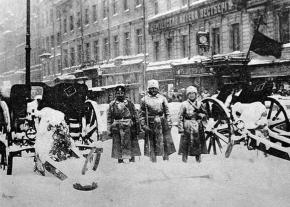Mining each vein of a rich history
October Song is the recent book by veteran U.S. socialist and historian Paul Le Blanc, a contributor to SocialistWorker.org. This work applies his analysis of the different themes of the Russian Revolution, developed over numerous books, to a retelling of the story of struggle itself and its aftermath and legacy.
, also a veteran socialist and author of numerous books, including The Theory of Revolution in the Young Marx, wrote a review of October Song for Le Monde Diplomatique. We republish it here, with his permission, in English translation.
THIS FASCINATING book, written by a well-known North American Marxist historian, stands out favorably from the dominant historiography, both anti-communist and apologetic of the former Soviet Union. Its main documentation is writings and testimonies from the revolutionary years, in all their diversity and their richness.
The central theme of the book is the question of democracy: according to the author, the initial Bolshevik project had a deeply democratic and pluralist content, which is reflected in the very composition of the first soviet government (a coalition between the Bolshevik Party and Left Social Revolutionaries).

The unprecedented violence of the civil war led to a process of authoritarian centralization of power, even if spaces of freedom, especially cultural, were preserved. The exactions of the Cheka (political police) and the repression of the peasant protests will have tragic consequences, creating the conditions for the advent of the Stalinist regime.
The Bolshevik revolutionaries acted on a democratic revolutionary wager — in the sense that the Marxist Lucien Goldmann gives to this term borrowed from Pascal. They were perhaps unsuccessful, but thanks to the October Revolutionary precedent “nothing can never be the same.”
Paul Le Blanc, October Song: Bolshevik Triumph, Communist Tragedy, 1917-1924. Haymarket Books, 2017, 479 pages, $27.95.


